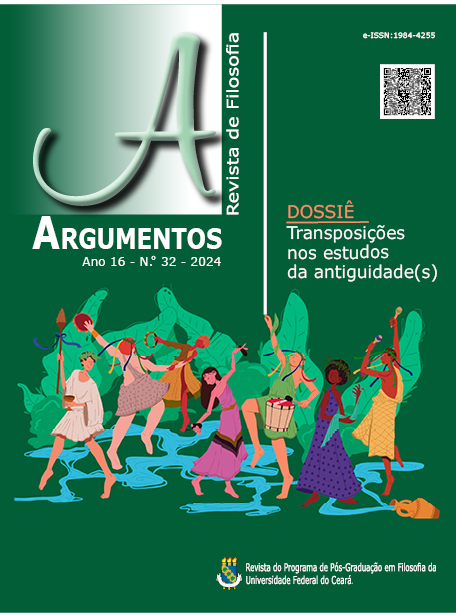Aristophanes and Plato: the agreement between on the problem of democratic freedom
Keywords:
Democracia. Liberdade. Disrupção. Censura.Abstract
Through a comparison between the satire on democratic expedients in Aristophanes’ Acharnians and the critique of democracy in Plato’s Republic, I intend to argue that comedy and philosophy arrive by means of diferent paths to a similar conclusion about the demos’ government, i.e., that their own operation provides the necessary elements for its disruption.
References
ARISTOPHANES. Acharnians. Edicted by Douglas Olson. New York: Oxford University Press, 2007.
KAGAN, D. A guerra do Peloponeso. Novas perspectivas sobre o mais trágico confronto da Grécia Antiga. Tradução de Gabriela Máximo. Rio de Janeiro: Record, 2003.
LEVITSKY, S.; ZIBLATT, D. Como as democracias morrem. Tradução de Renato Aguiar. Rio de Janeiro: Zahar, 2018.
PLATÃO. A República. Tradução de Anna Lia Amaral de Almeida Prado. São Paulo: Martins Fontes, 2006.
PLATONIS. Rempvblicam. Edicted by S. R. Slings. New York: Oxford University Press, 2003.
POPPER, K. A sociedade aberta e seus inimigos. Tradução de Milton Amado. 3. ed. Belo Horizonte; São Paulo: Ed. Itatiaia; Edusp, 1998.
SCHUMPETER, J. A. Capitalismo, socialismo e democracia. Tradução de Luiz Antônio Oliveira de Araújo. São Paulo: Unesp, 2016.
Downloads
Published
Issue
Section
License
Argumentos magazine is licensed under an International Creative Commons Attribution License.
The Magazine uses CC BY inclusion
1) The authors retain the copyright granted to the magazine or the right to initial publication, with the work regularly licensed under the Creative Commons Attribution, which allows the sharing of the work with acknowledgment of authorship and initial publication in this magazine.
2) The authors are authorized to contract additional applicable contracts, for non-exclusive distribution of the version of the work published in this journal (for example, publication in the institutional repository or as a chapter of the book), recognition of authorship and initial publication in this journal.
3) Authors are authorized and encourage to publish and distribute their work online (for example, in institutional repositories or on their personal pages) at any time before or during the editorial process, as they can generate productive changes, as well as increase the impact and reference of published work.




.jpg)










._._3.png)
1.jpg)
._._._.png)
